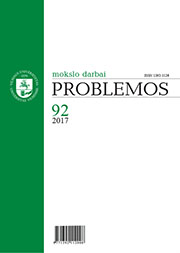AUGUSTINO „DE DIALECTICA“ IR ANKSTYVIEJI STOIKAI: KALBINIŲ REIKŠMIŲ SKYRYBOS
AUGUSTINE’S DE DIALECTICA AND THE EARLY STOICS: THE DIVORCE OF VERBAL MEANINGS (SAYABLES)
Author(s): Gintarė KurlavičiūtėSubject(s): Logic, Ancient Philosphy
Published by: Vilniaus Universiteto Leidykla
Keywords: Augustine; early Stoics; verbal meaning; sayable;
Summary/Abstract: This paper analyses Augustine’s conception of verbal meaning (sayable, dicibile) in his early work De dialectica. Scholars have often suggested that it is based on or at least is very similar to that of the early Stoics. It is claimed that the widely accepted view should be reconsidered. The gap between dicibile and λεκτόν becomes clear when questions are raised such as “what is the minimal meaningful unit?” and “Where are verbal meanings?”. Augustine is interested in meanings at the level of simple words (simplicia verba), while the main interest of the Stoics is to explore the meanings of statements (ἀξιώματα) – especially those statements which can be subject to truth and falsity. What is more, Augustine’s claim that meanings are contained in the mind, held within the mind, is incompatible with the claim of the Stoics that they subsist in accordance with thought, with a rational impression.
Journal: Problemos
- Issue Year: 2017
- Issue No: 92
- Page Range: 158-168
- Page Count: 11
- Language: Lithuanian

